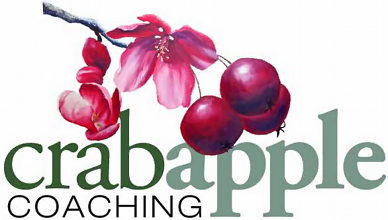Thoughts from a Retirement Coach
By Mariella Vigneux, MBA, ACC
Certified Professional Coach
I’ve been struggling with the notion of how to adjust to a new limitation. My knee is telling me that I should no longer run. Ever. This is a huge loss for me. Running represents so many good things – joy; the sense of wildness that comes when running in a snowstorm or being fleet of foot along the twisting forest trails, dodging brambles, roots and branches; the cleansed-lung feeling after a rigorous run, the Herculean sense of accomplishment when new distances are reached; the bliss of early morning sunshine sparkling on roadside grasses; and the self-esteem that spills over into other aspects of my life. That’s what running gives me.
In comparison – my loss is nothing
I know my loss is not a big deal when compared to the life and death struggle my father fought with cancer. He had to adjust to the ultimate limitation – the certainty that life would soon end. My loss is nothing compared to the limitations faced by a friend who lost his life partner. Or compared to the many people who are suddenly laid off from work in their mid-50s. Not to mention my colleague with multiple sclerosis or my neighbour with quadriplegia. And I know many people who have had to give up their own favourite sports – squash, hockey, marathon running. You have your own limitation to adjust to, I’m sure.
Creating new opportunities
In an odd way, it helps to acknowledge that people are facing worse situations. It gives me a better perspective and a sense of gratitude. I still have to find my own way through the disappointment and loss though. I still have to run the circuit of grief: denial (no, not me!), anger (why me, damn it!), bargaining (yes, it’s real, it has happened to me, but.. but…), depression (yes, it’s real, it has happened to me, bummer!), and acceptance (yes, it’s real, it has happened to me, and I’m ready now). Currently, my favourites are denial and anger.
A friend recently suggested that instead of seeing it as adjusting to new limitations I should consider it as creating new opportunities. Yup. Good advice. In the summer, I tuned up my son’s old trail bike and rode it along the dirt roads, whizzing by corn fields, travelling further than my running ever got me. I bought a pair of cross country skis and now regularly get into the woods, along my running trails. It’s lovely. But it’s not the same as running. I want to run.
What would a life coach say?
A life coach might ask me to create a vision of my ideal running alternative, to analyze my current reality, to assess the gap between the my reality and my ideal, and to start bridging the gap between the two – laying down small stepping stones to make the ideal vision become the reality.
I’m working on it. The skiing, the biking, and regular walks. It’s slowly coming along.
Glory days and the lost Boston Marathon jacket
I’ve been asking people how they adjust to unanticipated limitations. I’ve been watching and taking note.
One guy I know used to run marathons. Fit as a fiddle. Then the meniscus cartilage in his knee started to go and, even so, he pushed himself to the finish line at the Boston Marathon. He received a Boston Marathon jacket, but, his meniscus was totally ground down and he could no longer run.
He told me his identity was wrapped up in running. Many of his greatest moments had come as a runner. Those were his glory days.
Missing the camaraderie of lunch-time runs made seeing the runners leave the YMCA for a run too difficult for him, so he stopped going to the “Y”. Not one to remain still, however, he soon took up cycling. He used to complain that it wasn’t the same. Gradually, though, he increased his speed and distance. He got involved in time trials. He started going on adventure trips with a buddy and did a lot of trekking. He went on more canoe trips.
Recently, he lost his much-loved Boston Marathon jacket. He was very sorry to lose it, but much readier than he would have been a few years earlier. He is currently spending a month in New Zealand on yet another adventure trip. I don’t think he’s missing his marathon jacket.
Finding what you lost
How might we best adjust to limitations? I guess it’s about trying new things, finding ways that give you elements of what you lost. For the marathon runner, he found new ways to be competent, competitive, and to have adventure as well as camaraderie.
I’m finding fitness, competence, beauty and joy in the cross country skiing. The walks give me tranquility. I’m struggling with the cycling, but perhaps it will come.
Choosing how long to sit in your puddle
There’s nothing wrong with sitting in a puddle of anger, denial, or resistance. We need a chance to work through our thoughts and emotions, until we know where we want to go. I’ve heard that anger, for instance, masks helplessness, and we need to burn out the anger before we can deal with our helplessness. We can, at the same time, find ways to soothe our souls, through beauty and other people’s goodness. The trick is not to stagnate.
So, we each need to decide how long we’re going to sit in our current puddle. How long will we sit with anger, or denial, or resistance. We can become victims of our own emotions – stuck in a rut – if we don’t move on. How often do you see people stuck in a rut? I remember buying pots from a man at a yard sale and he talked to me, in a fiercely angry voice, about his wife leaving him – six years earlier. I talked to a fellow who had retired fifty years earlier and he couldn’t talk about anything other than the glory days, when he was working. We need to decide when we’re going to get over it and move on.
I like to think we are similar to water. When we’re up against a rock, we can find a way around it. We can always find a way to keep flowing.
What about you?
I am interested to hear how you adjusted to limitations. What have you been up against? Did you get stuck in a puddle for a while? What got you moving again? What worked to help you adjust to the new conditions? Please comment below.


I really like this article. It makes me think of all the times I’ve left behind something I loved doing (playing in a band, rugby, rowing) but also how, inevitably, I found another thing I loved to devote my energy to! Limitations stink, but opportunities abound 🙂
Yes, opportunities do abound. I’m going to go looking for a few. Thanks, Sylvie!